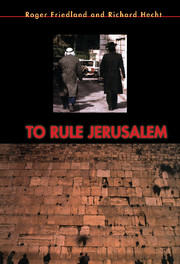Book contents
- Frontmatter
- Contents
- List of Illustrations
- Preface
- Acknowledgments
- Introduction
- 1 A Fearful Fusion
- Part I The Two Zions: Jews Against Zionism in Jerusalem
- Part II Zion Divine: Jerusalem as the Messianic Central City
- Part III Birth of a Nation
- 11 Platform for Palestine
- 12 Zion for Palestine
- 13 A State of Mind
- 14 The Islamic Challenge
- 15 Baghdad, Berlin, and Jerusalem
- Part IV Heart of Stone
- Notes
- Index
11 - Platform for Palestine
Published online by Cambridge University Press: 13 May 2010
- Frontmatter
- Contents
- List of Illustrations
- Preface
- Acknowledgments
- Introduction
- 1 A Fearful Fusion
- Part I The Two Zions: Jews Against Zionism in Jerusalem
- Part II Zion Divine: Jerusalem as the Messianic Central City
- Part III Birth of a Nation
- 11 Platform for Palestine
- 12 Zion for Palestine
- 13 A State of Mind
- 14 The Islamic Challenge
- 15 Baghdad, Berlin, and Jerusalem
- Part IV Heart of Stone
- Notes
- Index
Summary
Palestinians refer to the land as their mother. In the 1967 war, the territorial remnant from which they were to form a state was lost, their appointed lands all controlled by the Jews. But within the curse, there was a blessing, for this defeat was necessary to birth a Palestinian state.
By allying with Nasser's Egypt in 1967, the Hashemites of Jordan made a disastrous gamble. For the next quarter century, the Palestinians were caught in a triangle of Jordanian, PLO, and Israeli forces, each of which sought to turn them to their own purposes. The Jordanians hoped to retain the loyalties of their now-Israeli-occupied subjects and use their political energies to reclaim the lost lands for the Hashemite state. The PLO, formed shortly before the Six-Day War, understood these Palestinians as a subordinate component of the Palestinian nation, a pliant constituency who should support its claim to speak for all Palestinians, not only those living on the land, but the even larger diaspora throughout the Arab world. The Israelis saw them simply as Arabs, hoping they would accept circumscribed self-government under Israeli and/or Jordanian sovereignty. The Palestinians would defy them all.
Al-Quds Against Amman
Al-Nakbah, the disaster, the Palestinians call it. To the outrage of the Israelis, they sometimes translate the term for the 1948 war as “holocaust,” morally equating their status as victims of Zionist expansion with the extermination of Jews by the Nazis. The Palestinians entered the war still debilitated by the civil war they had fought over territorial compromise a decade earlier. Haj Amin al-Husayni had emerged from that struggle as Palestine's leading patriot.
- Type
- Chapter
- Information
- To Rule Jerusalem , pp. 245 - 273Publisher: Cambridge University PressPrint publication year: 1996

